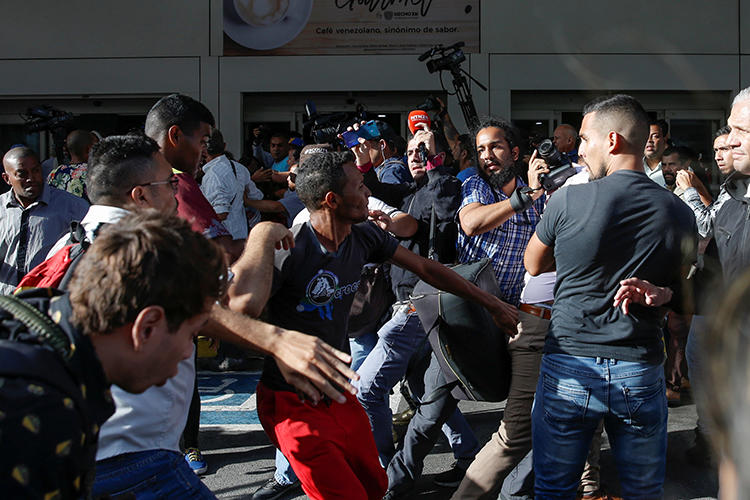Miami, February 13, 2020 — Venezuelan authorities should quickly and thoroughly investigate the violent attacks on journalists covering Juan Guaidó’s return to the country, and determine whether security forces were negligent in protecting journalists, the Committee to Protect Journalists said today.
On February 11, at about 4 p.m., supporters of Venezuelan President Nicolás Maduro beat and robbed journalists and media workers at the Simón Bolívar International Airport, outside Caracas, while they were covering the arrival of Guaidó, the president of the National Assembly who has been recognized by some countries as the interim president of Venezuela, according to journalists who spoke to CPJ and reports on social media by Venezuelan press freedom organizations Espacio Público and SNTP.
Venezuelan security forces observed the attacks but did not intervene to protect any of the journalists, according to the SNTP report and Maiker Yriarte, a reporter for the private broadcasters Union Radio and TVV, who spoke to CPJ in a phone interview.
“Everything happened under the gaze of the National Guard and the National Police. I went and asked one of them to help us. They did nothing,” Yriarte told CPJ.
“If Venezuela is to claim to have a free press, authorities must ensure that journalists can cover the news—however politically charged—without fearing for their safety,” said CPJ Central and South America Program Coordinator Natalie Southwick in New York. “Venezuelan authorities should conduct a transparent and thorough investigation into the attacks against journalists covering Juan Guaidó as well as security forces’ alleged failure to intervene and protect members of the press.”
Groups of people chanting pro-Maduro slogans and insults at Guaidó attacked Yriarte and his camera operator, César Díaz, punching them both in the face and kicking them, Yriarte said. One of the men was wearing a t-shirt featuring the name of Maduro’s political party and a picture of former President Hugo Chávez, as seen in images of the attack published in news reports.
“After two minutes of being beaten up I gave up and thought ‘they are going to kill me,’ when suddenly some colleagues were able to pull me out, put me in a vehicle, and drive me and César to a hospital,” Yriarte told CPJ. Yriarte said that he and Díaz were taken to the Instituto Clínico La Florida clinic in Caracas, were they were diagnosed with traumatic injuries and contusions. Both were released yesterday afternoon, Yriarte said.
In photos that circulated on social media following the attack, Yriarte and Díaz can be seen with bruises and swelling on their faces.
Yriarte said he also saw people attack several other journalists, including reporter Nurelyin Contreras, from the Punto de Corte news agency, and said one of the attackers bit her. Contreras recounted the attack in a video posted by Espacio Público on Twitter.
Yriarte said that some of the attackers were holding knives and razors, and threatened to cut the reporters.
Aymara Alonso, a reporter for the television outlet EVTV, told CPJ in a phone interview that Maduro supporters harassed, shoved, and insulted her, and tried to take her microphone to cut off her broadcast as she was covering Guaidó’s arrival live on air. The attack was captured on video, which EVTV posted to Twitter.
Some of the attackers robbed journalists on the scene, stealing their personal possessions and reporting gear, according to SNTP and Espacio Público.
Today, when journalists attempted to file a formal complaint about the attacks at the prosecutor’s office, armed police officers blockaded the building and did not let them enter, Espacio Público wrote in a post on Twitter.
CPJ called the National Police, the prosecutor’s office, and the National Guard for comment. The individual who answered the call at the headquarters of the National Guard said he had no information on the attacks. The other calls went unanswered.
CPJ has documented repeated attacks by armed pro-government militias, sometimes acting with support from security forces, against journalists in Venezuela.
